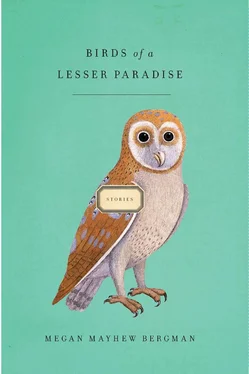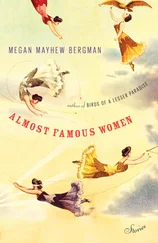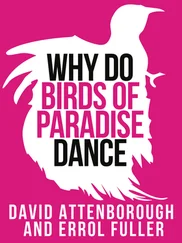See? he says. Think more like a field hand, less like an artist. If you ever worked in the real world, your boss would come down hard on you. Efficiency is important.
I turn my head, annoyed by my urge to cry.
We should talk about your hours, he says.
I don’t care about how fast I do things, I say, humiliated by his unwillingness to give me autonomy. Just how well.
That’s the bus, he says, heading for the front door. I don’t have time to sweep his muddy tracks, the crumbled manure in front of the display area.
In ten minutes, forty retirees are poking through the barn. Usually I take the lead on tours, but I stand quietly by the display, stacking and restacking rounds.
We run a small operation here, Pete says. Who’s tasted goat’s milk? Show of hands.
He raises his own hand. I want to remind him that though these people can’t hop on a four wheeler they have raised families and read books and lived through wars and they know how to raise their fucking hands.
Just then, Jesus walks through an open stall door and into the crowd.
Put the goddamn goat up, Pete hisses in my ear.
But the crowd converges on Jesus and she thrives beneath their curious hands. What do goats like to eat? they ask. What happened to her ears?
I feel myself come alive again. Soon, I have them tasting fudge and Havarti, and lock their warm dollars into a cold metal box.
Later that evening, after the bus has gone, Buzz comes to the Big House for dinner. It’s Willow’s birthday, and I’m in charge of cooking. I make a frittata (with goat cheese), a salad (with goat cheese), and cheesecake (with goat cheese).
I have the frittata broiling in the oven, and the cheesecake cooling on the sill. Willow circles the dinner table in her bare feet, topping off glasses.
Wine? she asks Buzz, a bottle of pinot in her hand.
Sure, he says. I don’t know anything about wine. How’s it go down after a few beers?
This is good, she says, touching his shoulder as he takes a seat at the table. You’ll like it.
Buzz takes a sip then stands back up, as he isn’t the type of guy to sit until Willow sits.
What can I do for you? he asks, looking her right in the eyes. Something seems off with his manner; perhaps he is emboldened by her birthday, or the wine.
Pete comes in and cracks open a bottle of Budweiser. He sits down with the paper and begins reading. Willow sits next to him and points to a pregnant woman on the cover of the Life and Style section.
I’ve been thinking a lot about babies, she confesses to Buzz.
You’re always thinking about things you can’t handle, Pete mumbles.
I think I’d make an excellent mother, Willow says.
Of course you would, Buzz says.
What do you know? Pete says, putting his paper down on the table.
There is a moment of silence where we all wonder how far this will go.
I’m going to grab a sweater from my room, Willow says, clearly uncomfortable. She heads toward the stairs.
I know you haven’t paid me in two weeks, Buzz says. I know where you go on Thursday evenings, and some Sundays.
That’s not your business, Pete says, pushing his chair back. What are you trying to say?
That you’re an asshole, Buzz says.
Pete lunges for Buzz across the table, just as Willow reappears. Pete’s body moves the table and the wineglasses fall to the floor. Willow reaches for one, but it’s already broken and her hand is cut.
Stop it, she says, rushing to the sink. I offer her a towel, which quickly turns red. Underneath the fluorescent kitchen light, I notice how badly her hair is thinning.
Let me see it, Buzz says, coming to the sink, reaching for Willow’s hand.
Before anything can change further, I slip upstairs. I don’t have a dog in this fight.
Willow leaves the shambles of her birthday party and follows me; I hear her small feet on the stairs. I already have my suitcases open on the bed.
Don’t leave, she says. We need you here.
You guys have to work some things out, I say. I need to find a place of my own.
We both know it isn’t possible, not for someone with roughly three hundred dollars stuffed into a Ziploc bag, but it’s easier than saying the truth: that I can’t bear to watch things fall apart.
We’ll get llamas, Willow says.
I need a change, I say.
She follows me out to the driveway. As I open the door to the truck, I see Jesus out of the corner of my eye.
I jump into the driver’s seat as fast as I can and close the door. I roll down the window.
Pete and Buzz have already worked it out, Willow says. Pete wrote him a check. Things are fine .
I shake my head and crank the engine. Jesus is there now, standing with her head down. I cannot see her eyes and can only imagine she is looking for a way to climb in. I reverse slowly, tires rolling across the gravel.
You didn’t do anything wrong, I say to Jesus.
I wave half-heartedly to Willow, who has her fingers in her hair, ready to pull.
My clothes smell like the farm, like hay and fermented compost, cold dirt. I take a parting glance at the barn on the hill, the lights wound into the bittersweet, the rambling, white farmhouse I shared with Pete and Willow. I think of the bathroom, where in the medicine cabinet sits my bottle of bourbon.
Take care, I call to Willow. Of yourself and the goats.
Four miles down the road I circle back to the farm for Jesus, because you can, I think, love someone who is not your kind. But then I turn around again. I can’t give her a good life, not now, no matter how big I dream. This summer I figure I’ll sleep in my truck, get a job pulling blueberries at another farm, regroup.
I’m headed north without thinking, past all the trees and houses of the imperfect Kingdom, whose hills are full of sap sheds, hunting cabins, the occasional moose, and maybe my father. It’s a place of pristine pastures and fucked-up fairytales, a place where a person like me could just up and disappear. Here I am driving without a license, free of the system, free of a job, or maybe what my parents dreamed for me that first morning in Shaktoolik: no one at all.
I talk to myself over the engine of my father’s truck, narrating my future: You will work hard. You will save money and find a person you love with whom to build a life on a beautiful farm with rolling hills. Your cheese will be renowned, and when the goats get old you will not slit their throats, but let them nibble alfalfa and live out their useless lives playing King of the Mountain on an old stone fence.
Sometimes it helps to lie. You tell yourself a story, even when you don’t know the ending.
A Scribner Reading Group Guide

Birds of a Lesser Paradise
Megan Mayhew Bergman
INTRODUCTION
Megan Mayhew Bergman’s Birds of a Lesser Paradise captures the surprising moments when the pull of our biology becomes evident, when love collides with good sense, and when our attachments to an animal or wild place can’t be denied. In “Housewifely Arts,” a single mother and her son drive hours to track down an African Gray Parrot that can mimic her dead mother’s voice. A population control activist faces the ultimate conflict between loyalty to the environment and maternal desire in “Yesterday’s Whales.” And in the title story, a lonely naturalist allows an attractive stranger to lead her and her aging father on a hunt for an elusive woodpecker. As intelligent as they are moving, the stories in Birds of a Lesser Paradise are alive with emotion, wit, and insight into the impressive power that nature has over all of us.
Читать дальше













